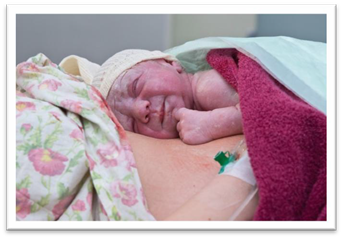Breastfeeding
Breastfeeding – the first few days
The first feed
Most babies will attach to the breast for their first feed if placed skin to skin (in contact) with their mother.
Skin to skin contact
This is when your baby is placed directly from birth onto your chest or abdomen. Your newborn’s skin touches your skin. A blanket or towel can be placed over the baby’s back for warmth if required. Providing baby and you are well, skin to skin contact should continue, undisturbed, until the first breastfeed. Routine procedures such as bathing and weighing can wait.
If you can’t have skin to skin right after the birth, this is often due to medical reasons.
Your midwife will support skin to skin contact as soon as possible.
More information: Queensland Clinical Guidelines parent information – Breastfeeding your baby

Most healthy babies will want to feed within the first 90 minutes after birth.
During skin to skin contact, your baby will show feeding signs (cues).
When this happens, position baby close to your breast.
Bonding and rooming in
After your baby is born, you will both be in the same room – you will be able to see signs that your baby is hungry, uncomfortable or needs to be cuddled.
Benefits of rooming in:
- babies cry less and are easier to calm
- mums get more rest
- you can respond to baby's early feeding cues and feed on demand
- you will make more breast milk when you feed your baby often.
The first few days
Newborn feeding behaviour
Birth to two hours
Baby is usually awake and alert (best time to feed).
The first 24 hours
Two to 20 hours after birth, baby will have light and deep sleep (may not want to feed often).
After 20 hours
Baby will have sleep and awake behaviour (and may want to feed often).
Day two to three
Your baby may seem unsettled on day two or three while your colostrum changes to mature milk. Increased breastfeeding is often all that is needed.
More information: NHS – Breastfeeding: the first few days
In this guide
- Breastfeeding 101
- In pregnancy – planning for breastfeeding
- Breastfeeding – the first few days
- Signs of hunger
- Breastfeeding – the early weeks
- Positioning and attachment
- Signs of an effective attachment
- Breastfeeding positions
- Common breastfeeding questions and concerns
- Common breastfeeding issues
- Breastfeeding in the first year
- Important points about breastfeeding